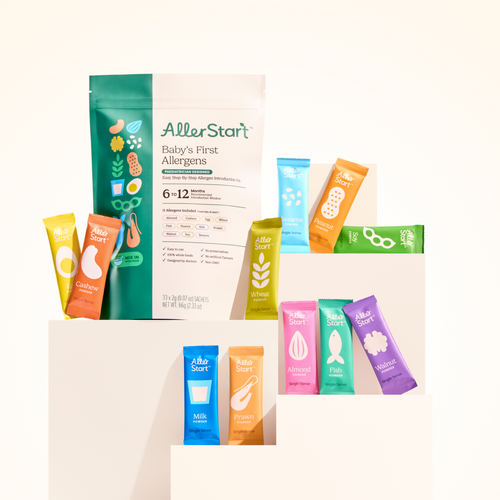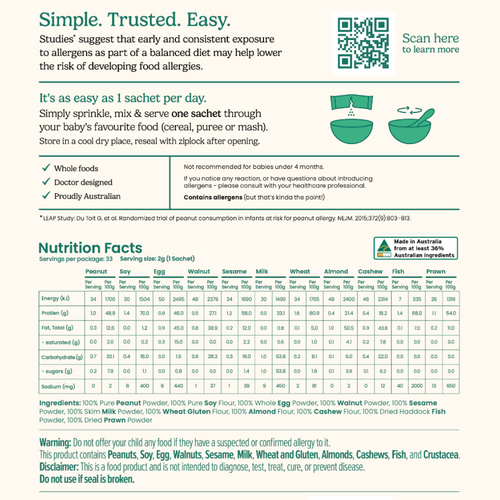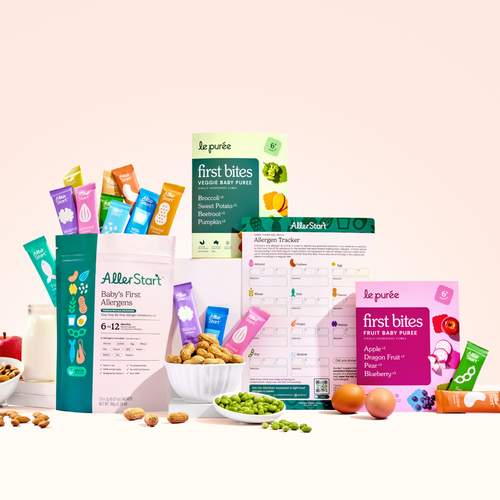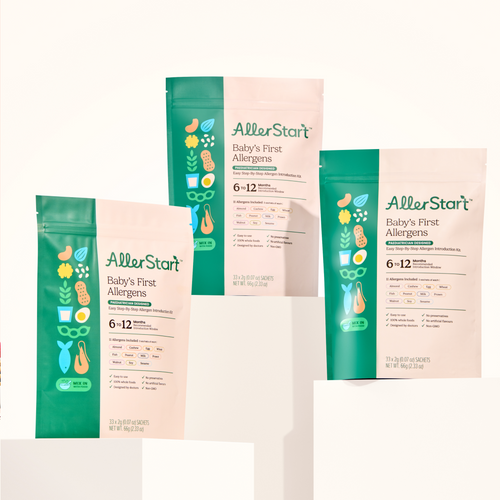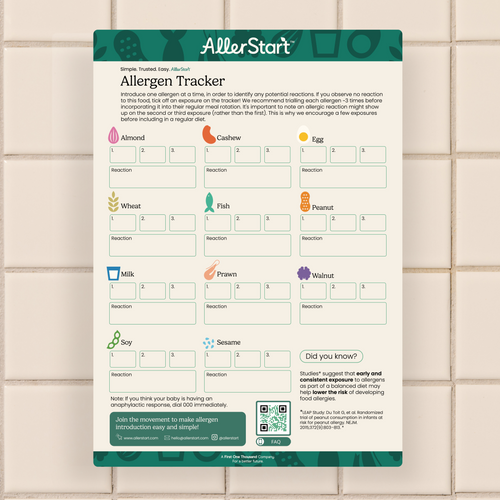By Dr. Chaitanya Bodapati (Dr Chai)

Dr. Chai is a dual trained Paediatric Allergy/Immunology Specialist and General Paediatrician who works in Sydney. Being a paediatrician she has a holistic approach when managing her patients' issues. Her first child had multiple food allergies, which has further helped her understand the impact it can have on a household from her own personal experience.
Common Allergen Questions I’m Asked by Parents
PICTURED: AllerStart Baby's First Allergens
How is a food allergy diagnosed?
There is no great test to diagnose a food allergy. Blood tests (specific IgE or RAST tests) and skin prick testing can be used as a guide but are not a diagnostic tool. The best test is having your child try the food in their diet. This can be a daunting thing to do. You can start with a small smear in their mouth and slowly increase the food in their diet if they tolerate the allergen. Never rub the food on their skin as this is not a good way to test food allergens.
What should I do if I think my child is having an allergic reaction?
If you think your child is having an immediate type allergic reaction, you should stop giving your child this food. In most cases children will have mild-moderate symptoms (hives/welts, swelling of the face/lips, abdominal pain or vomiting). This can be treated at home with an age-appropriate oral antihistamine. An antihistamine can help to reduce discomfort by settling the symptoms. Without any treatment the symptoms usually subside within hours. It can sometimes take up to 24hours for all the symptoms to resolve. If your child is experiencing any breathing difficulties or losing consciousness please call an ambulance immediately as this is a severe reaction and can be life threatening. After your child’s symptoms have settled you should see your local doctor for ongoing advice. In most cases you will then be referred on to see an allergy specialist. Unfortunately the wait times to see an allergist can be long. So in the meantime, we would generally suggest you continue to introduce the other allergens in a slow, graded and incremental manner at home.

PICTURED: AllerStart Baby's First Allergens
Is a rash around the mouth an allergic reaction?
Babies have very sensitive skin, particularly on their face. If they have eczema, their faces seem to be particularly vulnerable to developing redness around the mouth when they are eating foods. This is simply because any food touching their skin irritates the area. Foods that are acidic like tomatoes and citrus fruit are known to be particularly irritating to the skin. This is not an allergic reaction. It is generally safe to continue these foods in your child’s diet. It can be difficult to tell if this is an allergic reaction, particularly when your child is trying allergens for the first time. If in doubt please seek further advice from your local general practitioner.
Should I avoid introducing a food another family member is allergic to?
No, you should still introduce that allergen. Your child is at a slightly increased risk of developing a food allergy if a first-degree family member (parent or sibling) has a food allergy. This does not mean that they will definitely develop a food allergy. Nor does it mean that they are at risk of developing a food allergy to the exact same allergen either. For example your first child may have a known peanut allergy and your second child may develop an allergy to egg. Therefore the advice is to still introduce all allergens between 6-12months of age.
Once I’ve introduced the allergens, do I need to keep them up regularly in my child’s diet?
We know from studies that if an allergen is not kept up regularly in your child’s diet they can later develop an allergy to this food. So it is important to introduce allergens early but it is equally important to then keep them up in their diet on a regular basis. The general recommendation is to keep allergens in their diet at least a couple of times a week.
PICTURED: AllerStart Baby's First Allergens
Food-based ingredients in moisturisers, should I be applying them on my baby’s skin?
It has become evident that placing food products on the skin, especially in those with broken skin such as eczema, can put your child at risk of developing a food allergy. This is because your body develops antibodies to fight the food as it has been introduced to them via their skin. For some reason an introduction in this pathway makes the body think it is something they need to fight against. For this reason allergy specialists generally recommend the avoidance of skin products that contain food.
Final Thoughts
Navigating food allergies can be overwhelming, especially during the early stages of introducing solids. But with the right knowledge, support, and a calm, step-by-step approach, it is possible to raise confident little eaters, even in the face of allergy concerns.
If you’re feeling unsure or have questions about your baby’s reactions or risk factors, speak to your GP or seek guidance from an allergy specialist. You're not alone in this journey, and the more empowered you feel, the more empowered your child will be too.
For more tips on feeding, allergy prevention, and building a positive relationship with food from the very start, follow along at @dr.chai.bodapati_kids_allergy or visit www.childrensallergyclinic.com.au.
Dr. Chai





